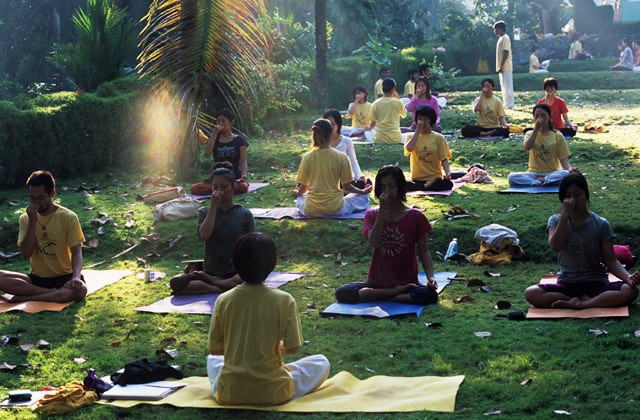
BY ANASTASIA
I often get approached by people, who ask for recommendations of ashrams in India where they can study yoga. At some point in time, both beginners in yoga and experienced yoga practitioners long to come closer to the source of knowledge.
Before suggesting a concrete place to go, I always ask, what is the real motivation for them to undertake such a journey. Is it the desire to advance their physical yoga practice, is it the search for spiritual growth, a way to heal from a trauma to detox body and mind, or maybe just an idea to spend a holiday in a useful way? For many, a yoga retreat in a beautiful set up in Goa or a residential stay in a yoga school can be just a much better option.
When you do decide to go to a real ashram to study yoga, there are a few things to consider, that will help you understand if it is the right place for you to stay.
Each ashram in India may have a different “authentic” approach to yoga
Many practitioners want to study yoga in an ashram so that they can experience real, authentic yoga. Depending on an ashram and its Guru the approach will differ considerably. Often, the focus does not lie on the physical practice, and a lot of time is dedicated to meditation or even social service. Asana practice might take only a small part of the day, if at all.
Be ready to practice “karma yoga”
Karma yoga means “the path of unselfish action” or “the discipline of selfless action as a way to perfection”. Depending on the place, this can imply either work in the kitchen, cleaning duty, or volunteering in the community.
Plan a longer stay
Programs like yoga holidays usually last between one and two weeks. Such schedule is a perfect match for those who can’t leave their jobs and families for a long time, but a stay in an ashram is a different story. If you are not going to attend a specific, shortened program, a minimum stay in an ashram can be anything between one and six months. The same rule typically applies to traditional yoga schools as well. When I was studying yoga in Mysore, I had to stay at least one month with my teacher.
Strict discipline is fundamental in the life of every ashram
When you stay in an ashram you agree to follow their regime and a way of life. The routine may include waking up as early as 4 am, performing prolonged meditations and following a strict schedule of activities.
Don’t expect your life to change overnight
Living in a modern world it is natural to expect quick results in all areas of our lives. A few weeks stay in an ashram, however, will not necessarily become a turning point of your life and might come with its challenges. Remember, spiritual growth is a life-long process and does not always adhere to our expectations.

Get familiar with the concept of Guru (or Teacher) in India
The concept of Teacher in India, especially in a traditional yoga setup, is very different comparing to the one in the West. It involves a lot of dedication (sometimes bordering devotion) and trust, and this tradition should be respected. To better understand the relationship between the Teacher and the Student in India, I recommend to take a look at the book by Swami Satyananda Saraswati “Taming the Kundalini”.
Respect the place where you are going
The rules of the place where you are going to stay might be different from what you are used to. Many traditional yoga schools, for example, have strict policies concerning clothes for yoga practice. Certain norms can extend outside the ashram, so it’s important to understand what is appropriate in the surrounding communities.
Expect a lot of quiet time and self-reflection
During your stay in an ashram, you will have a lot of “quite” time that is used for meditation and self-reflection. Some ashrams even dedicate a few hours a day in their schedules that residents are supposed to spend in complete silence. Even if you don’t opt for vipassana* for your stay in India (a complete silent meditation performed over multiple days), it might become an intense experience, but also a powerful tool to listen to oneself.
Check the living conditions
Life in a traditional ashram is often synonymous to ascetic life, with very basic accommodation and shared facilities. It also embraces a concept of a communal living. Some modern day ashrams do offer various lodging options that can fulfil the needs of everyone, but it comes at a price and can vary depending on a place.
Keep an open mind and heart and enjoy!
Staying in an ashram in India to study yoga and meditation can become a life-changing experience. It can also become a challenging time, and even a disappointment, if you are not ready for it. Challenges, however, are a necessary stepping stone on the path of personal growth. Choose your destination wisely and enjoy your time in beautiful India, regardless where you decide to stay!
Anastasia Sharova is an entrepreneur and a yoga practitioner who lives between Germany, India and Russia. She is the founder of Happy Bellyfish and the creator of Happily Globalized Blog. Anastasia writes about yoga, personal growth and life as an international entrepreneur. Follow her on Instagram.

